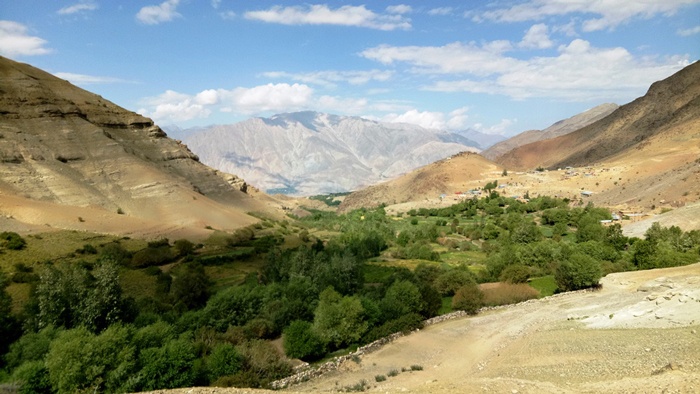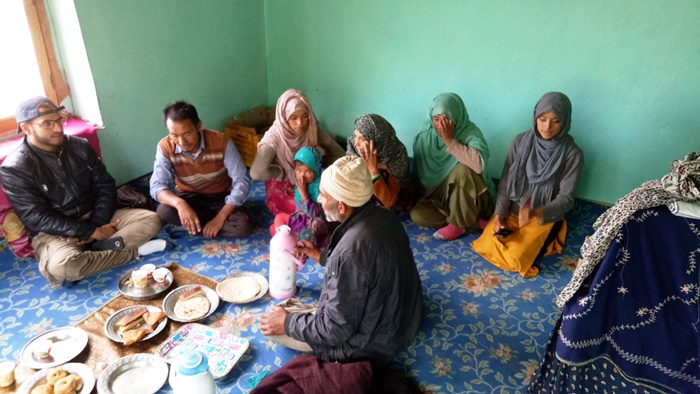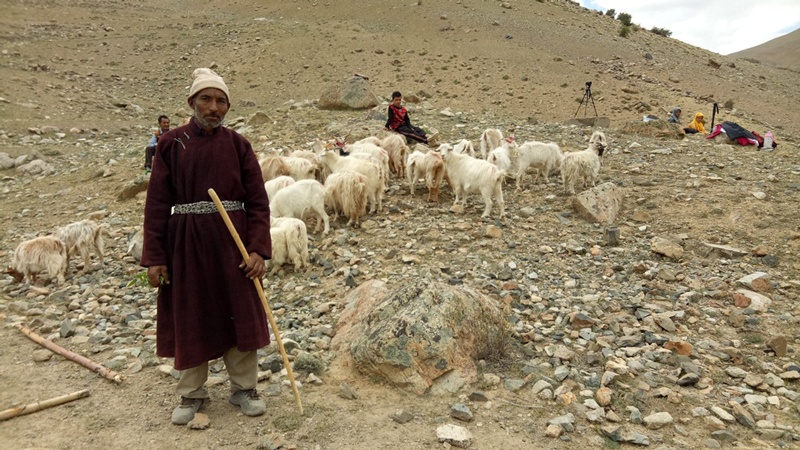A Crew in Cold Desert Before Dragon Cast its Shadow

Arif Nazir is a Staff Writer at the Mountain Ink.
Before Beijing’s belligerence would threaten the winter pastureland of Pashmina goat, a bunch of Kashmiri filmmakers were in Barchae to shoot how the brand Cashmere originates in rugged terrains.
Carrying heavy bags of equipment on his shoulders, Ahmad Ali kept watching our back. We were tracking to a place almost four kilometres from his village. “We’re just there,” said Ali, as the seething sun of July shone his half-tanned face.
To reach the small hamlet of some 30 kilometres from the main Kargil town, it took us more than 60 minutes to drive up the zigzag uphill roads that further go to the Batalic post, one of the frontlines of the 1999 Kargil War.
Having left from Kargil early morning when most of the shutters in the market were yet to go up, I along with my team was looking for the traces of the Pashmina Goats who are grazed only in the high mountains of Himalayas.
The road from Kargil to Barchae goes uphill with ‘S’ and ‘C’ shape curves after every 30 seconds. It has small patches of green apricot cultivation on its one side and giant naked canyons on its other side.
After driving for some 15 minutes, the signs of life start fading slowly. A few blind curves later, the presence of armed forces and their bunkers on highlands keep one surprised consistently.
Support Our Journalism
You are reading this because you value quality and serious journalism.
But, serious journalism needs serious support. We need readers like you to support us and pay for making quality and independent journalism more vibrant.
An hour of driving passed and our attention went to the other side of the road as a small hamlet turned into sight.

Located on the low-ground surrounded by hills on its either sides and an open green valley at its front with a stream passing through it, Barchae is a heavenly hamlet.
We pulled our vehicle near the cliff, offering a panoramic view of the entire village. At that elevation, a gust of cold breeze welcomed us. The feeling of winter in peak summer enthralled the sightseers.
Rubbing our hands and shoulders, we approached three middle-aged men, standing on the other side of the road — most probably discussing their day plans as they were to leave for Kargil city.
“Hello, what brings you here?” asked a man with salt and pepper looks and a warm smile on his face.
The men gave us a patient hearing, before one of them cut us short, “Just don’t worry. You’re at the right place but you people need to get warm clothes and some tea. You must be hungry.”
Assuring us help in tracking the Pashmina Goats, they directed their young to host and guide us well.
Within no time, we were welcomed in the house of the man who introduced himself as Ahmad Ali. Discussing the house and the village in the room totally alien to us, a lady interrupted us in an unfamiliar language.
The only word that helped us to make some sense was—‘heater’. She was repeating that word to keep us warm.
After offering us a few warm clothes, “Take it, sir, this will warm you up”, Ali walked out and kept talking to the women outside.

Everyone got busy picking the fit clothes while continuing discussing the village and the work we were supposed to do—filming the pashmina goats.
In between, a teenage girl entered the room with tea. Expecting a normal tea at 7:45 am, we were flabbergasted to see almost 10 people hosting us with a variety of homemade fresh bakery.

Among the middle-aged men and women, some four girls kept whispering and giggling discreetly—perhaps over some ‘urban wanderers’ and their ‘weird mannerism’. They reminded us of the Kalash girls in the sensational Coke Studio anthem, called ‘Pareek’.
An hour later, as the weather became warm, Ali interrupted everyone, saying, “We’re good to go for goat filming.”
Packing our equipment bags and lifting them on our shoulders, none among us missed to look behind—the beautiful house where everyone was waving at us with a warm smile.
As we started walking, Ali kept looking back making sure everyone behind is fine. Sensing the tiredness on anyone’s face, Ali kept offering his hand while saying, “Should I carry one of your bags? It’s too heavy.”
Through the green valley, we crossed over to the other side finding a track leading to a small hill-top that was a perfect place for us to film the pashmina goats.
As everyone was trying to breathe in some air, Ali pointed his finger to the mountain opposite and said, “During the Kargil War of 1999, the artillery mortars would strike this area”, while continuing as he faces the opposite direction, “you see the armed vehicles going up that top, that is Batalic post, one of the frontlines of the Kargil War”.
He shortly went to bring goats to the location. Walking briskly down the hill, he disappeared in the valley within a few minutes. I along with my team started observing the location.
Nearly 45 minutes later, the whispers quite familiar landed on the hill-top as the ‘Pareek’ girls of Barchae showed up with giggles, smiles on their shy faces.
Soon, Ali arrived with the flock of goats. And as we got busy with work, Ali reminded us, “If you eat properly, then only you can work.” With a smile, he lifted the bag full of eating items off his shoulders.
As the long day passed on the hill-top, Ali promised of being there, with the flock the next morning, as some part of the shoot was to be done.

On the way back, as we were walking downhill with the exhausted limbs, Ali was looking very calm and strong. “Before meeting you guys at 7:30 am on the location, I will be going to my farms around 3 am as it is my turn to water the harvest tomorrow,” he said as we drove back to Kargil.
Next morning, as we reached the location, Ali didn’t disappoint us. The flock was there, with its custodian.
Within the first half of the day, we finished our work and Ali was as cooperative as he always had been.
After packing-up, we again were at the point, where the hamlet was visible. It was time to say goodbye to Barchae and its Ahmad Ali.
At the parting moment, he became agitated, saying, “Don’t disrespect us!”
We had offered some money to the man for guiding, assisting and working with us, but for him, it was a matter of his and Barchae’s pride and hospitality.
To help us strengthen the tradition of quality reading and writing, we need allies like YOU. Subscribe to us.
Mountain Ink is now on Telegram. Subscribe here.
Become Our Ally
To help us strengthen the tradition of quality reading and writing, we need allies like YOU. Subscribe to us.











